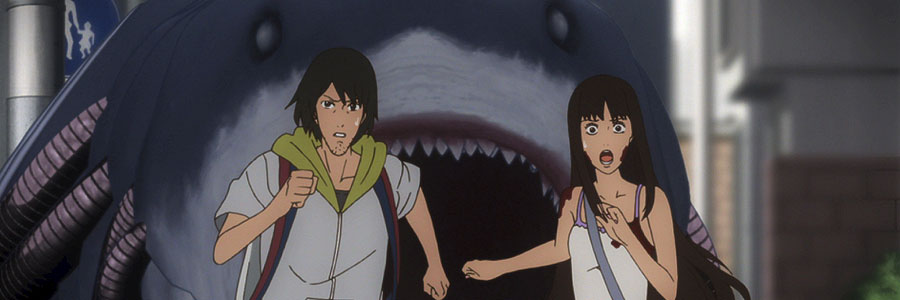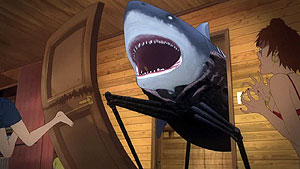
Gyo: Tokyo Fish Attack

GYO: TOKYO FISH ATTACK (MOVIE)
Terracotta Distribution
Release date: September 3rd, 2012
Running time: 71 minutes
Country of origin: Japan
Original language: Japanese
Director: Takayuki Hirao
Writer: Akihiro Yoshida, Takayuki Hirao
Cast: Mirai Kataoka, Ami Taniguchi, Masami Saeki

I was off to a strange start at this year’s Sci-Fi London’s Anime All Nighter. I ended up in the wrong screening room where I was subjected to an episode of Mystery Science Theatre 3000, missing the first feature of the night. An hour later, wondering what on Earth I’d just witnessed, I finally found the place I was supposed to be and started watching anime loaded up on sugar, coffee and energy drinks. Nevertheless, three films later around 6 o’clock in the morning my body was completely immune to the increased doses of caffeine and I thought my waking hours were coming to an end.
Much to my surprise, the penultimate film brought me right back to the world of the living. Takayuki Hirao’s bizarre monster movie Gyo: Tokyo Fish Attack was what I needed to stay awake. It constantly kept me wondering what exactly it’s trying to accomplish while also feeling that this was somehow part of the plan. An opening that’s nearly identical to the 1954 black and white classic Godzilla, Gyo begins with a Japanese fishing boat’s encounter with a grave enemy. This time though, the enemy is much odder than it is frightening and it stays out of full sight until three Tokyo girls have their graduation trip on Okinawa island completely ruined – scary movie style. Okinawa is only the first stop for the thousands of creatures that decided to leave the ocean behind and head for one of the most irresistible cities for monster rampage: Tokyo. The sea animals sport what looks like mechanical legs similar to spiders and if their hostility wasn’t quite enough; they also smell really bad.
The three girls with protagonist Kaori (Mirai Kataoka), feisty and mean Erika (Ami Taniguchi) and shy Aki (Masami Saeki) get caught up in the ensuing chaos that wasn’t designed for the audience to try to make sense of. After Kaori’s flight back to Tokyo in search of her fiancée ends with one of the coolest crash landings I’ve ever seen on screen, the atmosphere of a society trying to function under extraordinary circumstances felt realistic in the context of an over-the-top story. It’s exactly that – the atmosphere – that really got my liking for Gyo.

The tone jumps playfully back and forth between serious and comical throughout; we never know what might be waiting around the corner and whether laughter will be allowed or not. There’s a long list of Japanese films reflecting on the country’s past encounters with nuclear disasters and its own role in the war, disavowing an inherent human desire for power and destruction. I’ve always taken an appropriately solemn approach to these works, but I kept feeling that Gyo took this concept only so it could make fun of it. Maybe it thinks it’s time to move on from the demons of World War II.
The consensus at the screening seemed quite negative and my subsequent reading of a few reviews made me wonder if I liked Gyo: Tokyo Fish Attack only because of the sleep deprivation I suffered that night. After all, it’s a form of torture and it’s been used to make people say things they didn’t actually believe. What I gather from online forums, fans of the original manga are also very upset about some of the changes that were made to the film’s story. But I’m sure about one thing still: Gyo shouldn’t be looked at as a conventional Hollywood disaster film by pointing to plot holes and inconsistencies. The circus in the middle of a Tokyo motorway isn’t a plot hole and the desktop icon holding some of the secrets behind the frantic plot is not called “walking fish” because the filmmakers were running out of ideas.
These strange, tongue-in-cheek moments make fun of genres as well as the almost customary fictional contemplation of past mistakes; imitating a cautionary tale while laughing at it at the same time. This, accompanied by an unpredictably volatile tone, makes for a profoundly weird viewing experience that puts Gyo: Tokyo Fish Attack on the list of films I want to see again – only after taking a nap, of course.

Arpad Lukacs
Arpad is a Film Studies graduate and passionate photographer (he picked up the camera and started taking stills just as he began his studies of moving pictures). He admires directors that can tell a story first of all in images. More or less inevitably, Brian De Palma has become Aprad’s favourite filmmaker.
Then there’s Arpad’s interest in anime. He was just a boy when he saw Nausicaä of the Valley of the Wind on an old VHS and was hypnotised by the story of friendship, devotion and sacrifice. He still marvels at the uncompromising and courageous storytelling in Japanese anime, and wonders about the western audience with its ever growing appetite for “Japanemation”.
Have a look at Arpad's photography site, and you can follow him on Twitter @arpadlukacs.
© 2022 STATIC MASS EMPORIUM . All Rights Reserved. Powered by METATEMPUS | creative.timeless.personal. | DISCLAIMER, TERMS & CONDITIONS
HOME | ABOUT | CONTACT | TWITTER | GOOGLE+ | FACEBOOK | TUMBLR | YOUTUBE | RSS FEED
CINEMA REVIEWS | BLU-RAY & DVD | THE EMPORIUM | DOCUMENTARIES | WORLD CINEMA | CULT MOVIES | INDIAN CINEMA | EARLY CINEMA
MOVIE CLASSICS | DECONSTRUCTING CINEMA | SOUNDTRACKS | INTERVIEWS | THE DIRECTOR’S CHAIR | JAPANESE CINEMA





